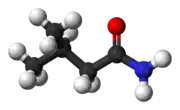Isovaleramide
Isovaleramide is an organic compound with the formula (CH3)2CHCH2C(O)NH2. The amide derived from isovaleric acid, it is a colourless solid.
 | |
 | |
| Names | |
|---|---|
| IUPAC name
3-Methylbutanamide | |
| Other names
Isopentanamide Isovaleric acid amide Isovaleric amide beta-Methylbutyramide | |
| Identifiers | |
3D model (JSmol) |
|
| ChemSpider | |
| ECHA InfoCard | 100.007.984 |
| EC Number |
|
| KEGG | |
PubChem CID |
|
| UNII | |
CompTox Dashboard (EPA) |
|
| |
| |
| Properties | |
| C5H11NO | |
| Molar mass | 101.149 g·mol−1 |
| Appearance | colourless solid |
| Melting point | 137 °C (279 °F; 410 K) |
| Boiling point | 226 °C (439 °F; 499 K) |
Except where otherwise noted, data are given for materials in their standard state (at 25 °C [77 °F], 100 kPa). | |
| Infobox references | |
Occurrence and biological activity
Isovaleramide is a constituent of valerian root.
In humans, it acts as a mild anxiolytic at lower doses and as a mild sedative at higher dosages.[1] Isovaleramide has been shown to be non-cytotoxic and does not act as a CNS stimulant. It inhibits the liver alcohol dehydrogenases and has a reported LD50 of greater than 400 mg/kg when administered intraperitoneally in mice.[2]
It is a positive allosteric modulator of the GABAA receptor, similarly to isovaleric acid. [3]
References
- "Use of isovaleramide as a mild anxiolytic and sedative agent", US 5506268
- Taillandier, Georges; Benoit-Guyod, Jean L.; Boucherle, Andre; Broll, Madeleine; Eymard, Pierre (1975). "Dipropylacetic series. XII. Anticonvulsant branched aliphatic acids and alcohols". European Journal of Medicinal Chemistry. 10 (5): 453–462.
- Giraldo SE, Rincón J, Puebla P, Marder M, Wasowski C, Vergel N, Guerrero MF (2010). "[Isovaleramide, an anticonvulsant molecule isolated from Valeriana pavonii]". Biomedica (in Spanish). 30 (2): 245–50. doi:10.7705/biomedica.v30i2.187. PMID 20890571.
This article is issued from Wikipedia. The text is licensed under Creative Commons - Attribution - Sharealike. Additional terms may apply for the media files.